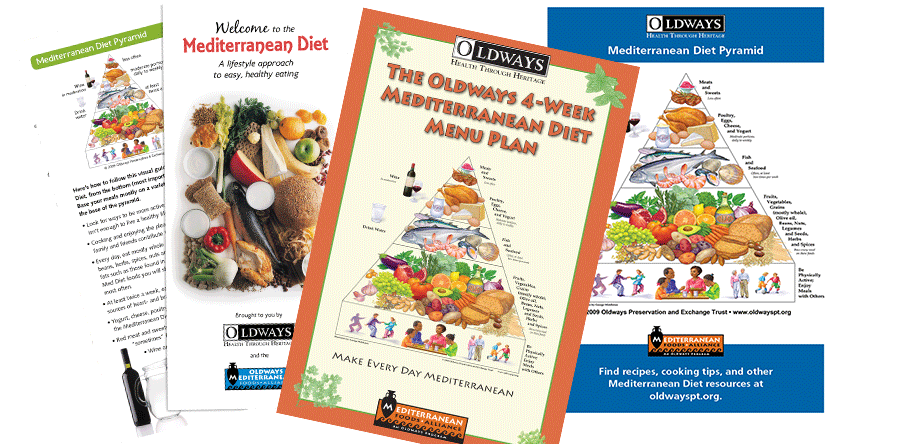Share This
Scientists and doctors agree. The Mediterranean Diet is a very healthy way to eat and can support the primary prevention of chronic diseases like heart disease. Along with Oldways, Walter Willett, David Katz, and the other scientists who came to a consensus about healthy eating at Oldways’ Finding Common Ground conference in November 2015, leading experts agree on the merits of the Mediterranean Diet.
- Dr. Sanjay Gupta, a practicing neurosurgeon and columnist for Time magazine, a contributor to CBS News, and a chief medical correspondent at CNN, has written “the Mediterranean Diet — an eating plan rich in olive oil, nuts, fruit, vegetables, and fish — lowers the risk of heart attacks and other cardiovascular events better than a low-fat diet, according to a recent study.”
- The Mayo Clinic says, “If you’re looking for a heart-healthy eating plan, the Mediterranean Diet might be right for you.”
- The New England Journal of Medicine published a landmark study in 2013, called PREDIMED, that supports the benefits of the Mediterranean Diet for the primary prevention of cardiovascular disease. So startlingly positive were the results that they stopped the study so the control group not on the Mediterranean Diet could start following this healthy, delicious way of eating.
Even the U.S. government agrees: their newest Dietary Guidelines include the Mediterranean Diet along with the DASH Diet and the Vegetarian Diet as recommended healthy dietary patterns. While it’s true — one size doesn’t fit all — there is widespread agreement among scientists that the Mediterranean Diet is an incredibly healthy and tasty way to eat.
But what’s a doctor to do in the office? Doctors are on the front line, in a great position to talk with patients about changing eating habits to improve their health outcomes (heart disease, cancer, diabetes, obesity, among other health problems). However, this conversation between physician and patient is made much more difficult for one main reason: Most physicians practicing today received little or no nutrition training in medical school. As recently as 2010, a survey published in the journal Academic Medicine showed that only 26 of the 105 responding medical schools required even one dedicated nutrition course. In general, medical students received an average of 19.6 contact hours of nutrition instruction during their medical school careers, and only 28 (27%) of the 105 schools met the minimum 25 required nutrition education hours set by the National Academy of Sciences.
In 2001 Oldways saw this problem as an opportunity and began a Mediterranean Diet continuing medical education (CME) program in Mediterranean countries — marrying nutrition education with cooking lessons, producer visits, and meals. While we may have been ahead of our time, today there is a gratifying and overdue surge in culinary education for physicians. Just last night (May 8, 2017), the PBS NewsHour ran a segment called, “To improve patient health, the doctor is in….the kitchen.” This segment featured the joint Harvard School of Public Health-Culinary Institute of America program, Healthy Kitchens, Healthy Lives, and also a physician-led cooking class at the Casey Health Institute in Gaithersburg, Maryland. And at Tulane University, the Goldring Center for Culinary Medicine is the first dedicated teaching kitchen to be implemented at a medical school. The center provides hands-on training for medical students through culinary medicine classes (both electives and seminars) as well as continuing education for the healthcare and foodservice industries.
To aid physicians as they talk with their patients about the very powerful connection between diet and health, Oldways is in the right place with a wide variety of consumer-friendly resources to help everyone understand and embrace the Mediterranean Diet.
A few key facts from the CDC add context to the urgency and importance of physicians providing information about healthy eating and lifestyle changes:
- Chronic diseases are the leading causes of death and disability.
- 70% of annual deaths are due to chronic diseases.
- These preventable conditions not only compromise quality of life, they add to rising health care costs — 75% of our health care dollars are devoted to treating these diseases.
- Among adults ages 20 to 74, diabetes remains the leading cause of kidney failure, blindness, and non-traumatic lower-extremity amputations.
To start new conversations, in March of 2017 Oldways decided to talk directly with physicians about the power of the Mediterranean Diet. We attended the 2017 American College of Cardiology Conference and exhibition, with nearly 13,000 doctors and related health professionals from around the world. Sadly (though not surprisingly) we were the only food-related exhibit on the show floor; we were surrounded by pharmaceuticals, machines, and software — all important tools for physicians.
Undaunted, we introduced the doctors to some alternative and very cost-effective tools: Oldways 4-Week Mediterranean Diet Menu Book, Mediterranean Diet grocery lists, Mediterranean Diet Pyramid Prescription Pads, Mediterranean Diet brochures, and more! We were pleased to see that they welcomed our solutions for discussing the basics of healthy eating within the time constraints of a typical appointment, and hope that more physicians — family physicians, cardiologists, gastroenterologists, and more — will grasp the importance of lifestyle change and talk with their patients about the power each of them has to change their health and their lives.
As Jane Pearson, MD, Medical Director, Preventive Cardiology and Cardiac Rehabilitation, Dean and St. Mary’s Medical College, told us:
“Your work makes mine more effective as I dedicate my days to keeping patients healthy.”
Now’s the time, doctors. May is Mediterranean Diet Month, and what better way to celebrate than by talking to your patients about healthy eating, Mediterranean-style?
Sara Baer-Sinnott, Oldways President




Add a Comment